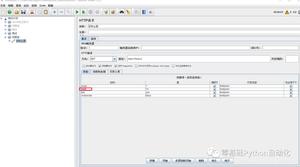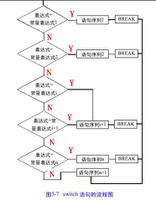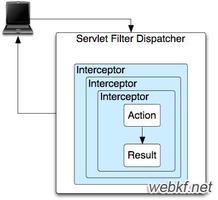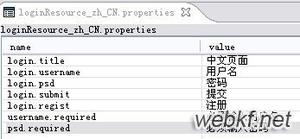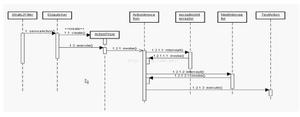struts2单个文件上传的两种实现方式
通过2种方式模拟单个文件上传,效果如下所示

开发步骤如下:
1、新建一个web工程,导入struts2上传文件所需jar,如下图
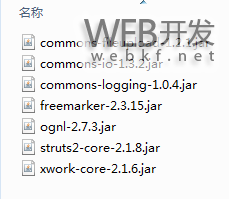
目录结构
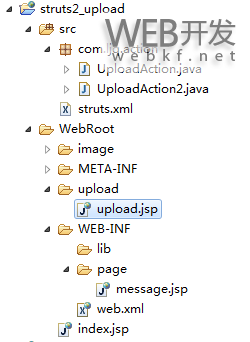
2、新建Action
第一种方式
import java.io.File;
import org.apache.commons.io.FileUtils;import org.apache.struts2.ServletActionContext;
import com.opensymphony.xwork2.ActionContext;import com.opensymphony.xwork2.ActionSupport;
@SuppressWarnings("serial")public class UploadAction extends ActionSupport{ private File image; //上传的文件 private String imageFileName; //文件名称 private String imageContentType; //文件类型
public String execute() throws Exception { String realpath = ServletActionContext.getServletContext().getRealPath("/images"); //D:\apache-tomcat-6.0.18\webapps\struts2_upload\images System.out.println("realpath: "+realpath); if (image != null) { File savefile = new File(new File(realpath), imageFileName); if (!savefile.getParentFile().exists()) savefile.getParentFile().mkdirs(); FileUtils.copyFile(image, savefile); ActionContext.getContext().put("message", "文件上传成功"); } return "success"; }
public File getImage() { return image; }
public void setImage(File image) { this.image = image; }
public String getImageFileName() { return imageFileName; }
public void setImageFileName(String imageFileName) { this.imageFileName = imageFileName; }
public String getImageContentType() { return imageContentType; }
public void setImageContentType(String imageContentType) { this.imageContentType = imageContentType; }
}
第二种方式
import java.io.File;import java.io.FileInputStream;import java.io.FileOutputStream;import java.io.IOException;
import org.apache.struts2.ServletActionContext;
import com.opensymphony.xwork2.ActionSupport;
@SuppressWarnings("serial")public class UploadAction2 extends ActionSupport {
// 封装上传文件域的属性 private File image; // 封装上传文件类型的属性 private String imageContentType; // 封装上传文件名的属性 private String imageFileName; // 接受依赖注入的属性 private String savePath;
@Override public String execute() { FileOutputStream fos = null; FileInputStream fis = null; try { // 建立文件输出流 System.out.println(getSavePath()); fos = new FileOutputStream(getSavePath() + "\\" + getImageFileName()); // 建立文件上传流 fis = new FileInputStream(getImage()); byte[] buffer = new byte[1024]; int len = 0; while ((len = fis.read(buffer)) > 0) { fos.write(buffer, 0, len); } } catch (Exception e) { System.out.println("文件上传失败"); e.printStackTrace(); } finally { close(fos, fis); } return SUCCESS; }
/** * 返回上传文件的保存位置 * * @return */ public String getSavePath() throws Exception{ return ServletActionContext.getServletContext().getRealPath(savePath); }
public void setSavePath(String savePath) { this.savePath = savePath; }
public File getImage() { return image; }
public void setImage(File image) { this.image = image; }
public String getImageContentType() { return imageContentType; }
public void setImageContentType(String imageContentType) { this.imageContentType = imageContentType; }
public String getImageFileName() { return imageFileName; }
public void setImageFileName(String imageFileName) { this.imageFileName = imageFileName; }
private void close(FileOutputStream fos, FileInputStream fis) { if (fis != null) { try { fis.close(); } catch (IOException e) { System.out.println("FileInputStream关闭失败"); e.printStackTrace(); } } if (fos != null) { try { fos.close(); } catch (IOException e) { System.out.println("FileOutputStream关闭失败"); e.printStackTrace(); } } }
}
struts.xml配置文件
<struts> <!-- 该属性指定需要Struts2处理的请求后缀,该属性的默认值是action,即所有匹配*.action的请求都由Struts2处理。 如果用户需要指定多个请求后缀,则多个后缀之间以英文逗号(,)隔开。 --> <constant name="struts.action.extension" value="do" /> <!-- 设置浏览器是否缓存静态内容,默认值为true(生产环境下使用),开发阶段最好关闭 --> <constant name="struts.serve.static.browserCache" value="false" /> <!-- 当struts的配置文件修改后,系统是否自动重新加载该文件,默认值为false(生产环境下使用),开发阶段最好打开 --> <constant name="struts.configuration.xml.reload" value="true" /> <!-- 开发模式下使用,这样可以打印出更详细的错误信息 --> <constant name="struts.devMode" value="true" /> <!-- 默认的视图主题 --> <constant name="struts.ui.theme" value="simple" /> <!--<constant name="struts.objectFactory" value="spring" />--> <!--解决乱码 --> <constant name="struts.i18n.encoding" value="UTF-8" /> <!-- 指定允许上传的文件最大字节数。默认值是2097152(2M) --> <constant name="struts.multipart.maxSize" value="10701096"/> <!-- 设置上传文件的临时文件夹,默认使用javax.servlet.context.tempdir --> <constant name="struts.multipart.saveDir " value="d:/tmp" /> <package name="upload" namespace="/upload" extends="struts-default"> <action name="*_upload" class="com.ljq.action.UploadAction" method="{1}"> <result name="success">/WEB-INF/page/message.jsp</result> </action> </package> <package name="upload2" extends="struts-default"> <action name="upload2" class="com.ljq.action.UploadAction2" method="execute"> <!-- 动态设置savePath的属性值 --> <param name="savePath">/images</param> <result name="success">/WEB-INF/page/message.jsp</result> <result name="input">/upload/upload.jsp</result> <interceptor-ref name="fileUpload"> <!-- 文件过滤 --> <param name="allowedTypes">image/bmp,image/png,image/gif,image/jpeg</param> <!-- 文件大小, 以字节为单位 --> <param name="maximumSize">1025956</param> </interceptor-ref> <!-- 默认拦截器必须放在fileUpload之后,否则无效 --> <interceptor-ref name="defaultStack" /> </action> </package></struts>
上传表单页面
<!DOCTYPE HTML PUBLIC "-//W3C//DTD HTML 4.01 Transitional//EN"><html> <head> <title>文件上传</title>
<meta http-equiv="pragma" content="no-cache"> <meta http-equiv="cache-control" content="no-cache"> <meta http-equiv="expires" content="0"> </head>
<body> <!-- ${pageContext.request.contextPath}/upload/execute_upload.do --> <!-- ${pageContext.request.contextPath}/upload2/upload2.do --> <form action="${pageContext.request.contextPath}/upload2/upload2.do" enctype="multipart/form-data" method="post"> 文件:<input type="file" name="image"> <input type="submit" value="上传" /> </form> <br/> <s:fielderror /> </body></html>
显示结果页面
以上是 struts2单个文件上传的两种实现方式 的全部内容, 来源链接: utcz.com/p/207284.html

